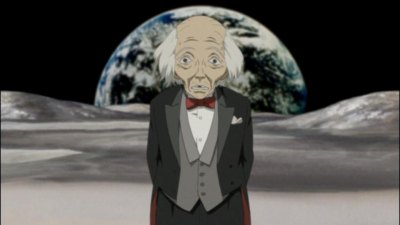|
One small question
|
|
Hi, I'm new here. I'd just like to start off with one question: Is the Universe cooling down? If so, at what temperature will it reach Thermal equilibrium? |
|
Re: One small question
Link |
by
|
|
this is no small question. but i will give you a small answer, cause its late. the universe may or may not be a closed system. if it is a closed system, it will reach equilibrium once all black holes have evaporated, at zero. 


|
|
Re: One small question
|
| Thank you, but according to the laws of thermodynamics, it's impossible to reach 0 Kelvin. And the Universe is supposed to be closed and the energy in heat really can't just "disappear". BTW, Gendou, isn't your signature Schrodinger's wave function in Quantum Mechanics? |
|
Re: One small question
Link |
by
|
|
And old example used by a former teacher of mine, is that of a pizza left out on the table. The pizza, once hot after being cooked, cools down to room temperature over time. Over time, energy will dissipate and spread evenly over the universe. As Gendou said, equilibrium will be achieved. There will still be heat and energy, but there will be no heat gradients and thereby no heat transfers. Basically, heat death. Yet still, no absolute zero, just something very close.  The greatest joy is the shameful joy The greatest joy is the shameful joy |
|
Re: One small question
|
|
Note that Gendou's self confessed small answer is conditional: if the universe is a closed system. The following is also conditional, if the universe isn't closed then it could be slightly different.
Wait a minute, are you sure about that?
|
|
Re: One small question
|
|
If the universe is not a closed system, this means that the heat is going to or coming from somewhere else. Where? I don't have any idea... There is one more thing... Our Universe is expanding. This means that heat will have to keep on spreading out. Oh, and black holes explode, releasing heat and radiation, acccording to Prof. Stephen Hawking FRS. |
|
Re: One small question
Link |
by
|
|
@cwjian, i would say the universe could very well be a closed system. the fact that most galaxies seem to be accelerating away seems to imply a closed system, but is far from conclusive evidence. it is a perfectly reasonable position to remain, for the time being, agnostic as to the open- or closed-ness of the universe as a thermal system. to correct you on your mention of Hawking's theory, black holes do NOT explode. really really big STARS explode, which is called a supernovae event, and the remaining matter condenses into a space so small that the massive gravitational effect of the remaining star confined to a small space produces the event horizon and is considered a black hole. what you are likely referring to, in Hawking's work, is the realization that black holes DO emit energy, in the form of electron/positron pairs which form at the event horizon. some of these particles escape the gravitational pull of the black hole, due to complex mathematics that i have not read up on myself. the result is, black holes evaporate and die, just like everything else (stars, people, etc.). that has no ramifications either way in the debate about wether or not the universe is an open or closed thermodynamic system. EDIT: responding to you question about 0 kelvin, i think that once all the energy in the universe has drifted far enough apart, the average temperature across space will asymptotically approach zero kelvin, but, like you said, it is not possible to reach it. you caught me there! :D also, i would point out that energy does not have to "disappear" to be spread so thin that its uneventful. an example is the "empty space" or the vacuum of space, which is not really empty at all, but a sea of photons and sparsely distributed hydrogen atoms. not quite empty, but not all that exciting. 


|
|
Re: One small question
|
|
Well, in his first paper on the effect of Heisenberg's Uncertainty Principle (HUP)on black holes, he did say something about explosions but you're right. They simply evaporate when they die. It's not too complex. The equation for this process is actually quite simple. What Hawking was saying is that virtual particles will pop up from 'nowhere' due to the uncertainty in time and energy (a result of HUP) and ,recalling that E=MC2, energy = particle + antiparticle If one of the particles is pulled into the black hole, the other will be left without its partner to annihilate and will then escape as radiation, resulting in the black hole 'having' a temperature and an entropy. And that, is the creation Hawking Radiation. ;) Here's something else, IF the Big Crunch occurs, what will happen to the entropy of the Universe? By the way, am I correct about your signature? It looks familiar... |
|
Re: One small question
Link |
by
|
|
If I recall correctly, Gendou has stated before that it is indeed the time-independent Schrödinger equation for a particle of mass m, moving in a potential U(x). Or something close to that, I am not familiar with it myself.  The greatest joy is the shameful joy The greatest joy is the shameful joy |
|
Re: One small question
|
|
Well I just wanted to say that the HUD principle can only apply if the theory of our universe being a closed system, there is another theory that states were are in bubbles and we could be in a multiuniverse complex. Thus implying that the energy will always have somewhere to go i.e. another one of those universes or even another dimension
Anime rox ç§ã¯pro =D
|
|
Re: One small question
Link |
by
|
|
this "other theory" would be fine and dandy if it weren't for the fact that it cannot be tested. any concept that cannot be tested is not a "theory" at all! there is ample evidence for the HUP, and none for any sort of multi-universe. i don't know how one proves that multi-universe theory nullifies the HUP, but i suspect any such argument has holes in it. uncertainty is an observed fact of nature, not some consequence of mathematics. the math must match the universe, not the other way around! 


|